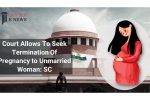Unregistered document can be looked into to prove conduct of the parties and the nature of possession enjoyed -SC

OCTOBER 1, 2021
After completion of the evidence on behalf of the respondent, appellants filed the evidence affidavit and sought to mark the Kharurunama and receipt dated 08.12.1993. By the impugned judgment the High Court has found that in the absence of registration and not being stamped the documents were inadmissible. It is submitted by the appellants that the Family settlement Khararunama dated 15.04. In his examination the respondent admitted his signature in the said ‘Khararunama‘ and the same has been marked as B1 to B3. It is further submitted that the respondent as PW1 has admitted his signature on the receipt dated 08.12. B9 to B11 are stated to be admission of signature on the Khararunama dated 15.04. It is pointed out that High Court erred in not considering the family settlement Khararunama and receipt dated 08.12. 1993 in accordance with well-established principles relating to the law of family settlement /family arrangement. Appeal to Apex Court :family settlement must be a bona fide one so as to resolve family disputes and rival claims by a fair and equitable division or allotment of properties between the various members of the family ,The said settlement must be voluntary and should not be induced by fraud, coercion or undue influence; The family arrangement may be even oral in which case no registration is necessary; It is well settled that registration would be necessary only if the terms of the family arrangement are reduced into writing. In such a case the memorandum itself does not create or extinguish any rights in immovable properties and therefore does not fall within the mischief of Section 17 of the Registration Act and is, therefore, not compulsorily registrable. “.Order 13 Rule 3 of the Code of Civil Procedure, 1908 (hereinafter referred to as ‘the Code’, for short) enables the Court to reject any document which is considered irrelevant or otherwise inadmissible recording the ground of such rejection. Section 49 deals with the effect of non-registration of documents which are compulsorily registrable under Section 17 of the Registration Act and Transfer of Property Act. Section 49 of the Registration Act declares that an unregistered document which is compulsorily registrable cannot ‘affect’ any immovable property comprised therein. The Khararunama dated 15.4.1986 cannot be used as evidence to prove the factum of relinquishment of right which took place in the past, but can be looked into to prove conduct of the parties and the nature of possession enjoyed by them. The cardinal principle would be whether by allowing the case of the party to consider an unregistered document it would result in the breach of the mandate of the Section 49 of the Registration Act. The Khararunama may not attract Section 49(1)(a) of the Registration Act. The document does not purport to by itself create, declare, assign, extinguish or limit right in properties. That is, it merely refers to what the appellants alleged were past transactions. Appeal is allowed
KORUKONDA CHALAPATHI RAO & ANR
VERSUS
KORUKONDA ANNAPURNA SAMPATH KUMAR






